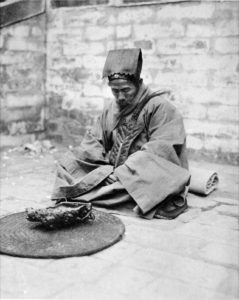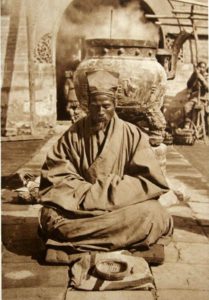苦
Bitterness
_________________________________________________
道在苦中求。
The Dao is sought within bitterness.
________________________________________________

The term Bitterness [ku苦] is often translated as hardships into English, however it could be argued that nuances of its meanings are shaved off by this over-simplification. When Li Shi Fu embarked on a journey throughout China in order to find a master in Hu Nan on Mount Heng and Mount Tian Long it was truly bitter, in the years’87, ’88, ’89. Li Shi Fu went on an ascetic wandering. He and his travelling companions only had bland water, boiled veggies and added some salt. They were without tents, and just grabbed some grass to sleep on, let alone mosquitoes. At night they were afraid of insects flying into their ears, therefore they blocked their ears with cotton wool; it was truly bitter.
When comparing Li Shi Fu’s training back in the days to students of today, it could be said that the present practitioners are too joyful, happy and lucky, while Li Shi Fu’s generation was raised in bitterness. From within bitterness a cultivator should sublimate and ascend their thoughts. Without passing through hardships to test and challenge your thoughts , this path of cultivation will be very long. There are many stories of hardship and bitterness of Daoist sages as well as of Buddhist monks. This process through bitterness enables you to understand your physical body and its limits. None of the saints, sages and great masters has through comfort cultivated the Dao and become an immortal and. Furthermore, no one created real Gong Fu within and from comfort. Its notion includes studying which is also a bitter undertaking requiring a lot of mental effort. Add time to experience what you learn and familiarize with the knowledge you studied. This knowledge of enduring bitterness can be attributed to the experience and summary of Jesus, Lao Zi and Shakyamuni.
The Dao is sought within bitterness.
Only through bitterness is one able to appreciate sweetness.
Only by knowing bitterness is one able to know sweetness.

At this day and age everyone knows sweetness too well. Everyone goes or lives in the big cities and there is so much fun, and delicious foods to eat. That is why there is no need to teach about sweetness. Through endurance, through learning to endure, through mastering to endure and through suffering is one able to appreciate life and being alive. Li Shifu drew the analogy of travelling to the North-East of China where temperatures drop to thirty to forty degrees below zero. A fire is truly precious in those areas. The example might be different, but the principle and logic are identical.
Bitterness can be divided into two types; namely the form type and the formless type. The former is what a human is in need of, for instance food, whereas the latter, the formless, refers to one’s thoughts, which are very hard to resolve. At the level of consciousness bitterness is the time when one is uncomfortable, which is exactly the right time to practice endurance. Demons exists in order to test you, in fact angels and demons actually originate from the same place . They could be compared to the Dao, when it split into two -Yin & Yang. Jesus never said to get rid of all the demons. It could be debated that the demons are the crucial factor in one’s path of cultivation, and, thus, indispensable for sublimation and ascension.
_________________________________________________
Post-Scriptum:
This article will appear in the appendix of Purple Cloud Press’ forthcoming publication of 《The 49 Barriers of Cultivating the Dao》 by Xing De/Li Shi Fu, a manual for refining one’s Inner Nature based on Liu Yi Ming’s 50 Barriers
